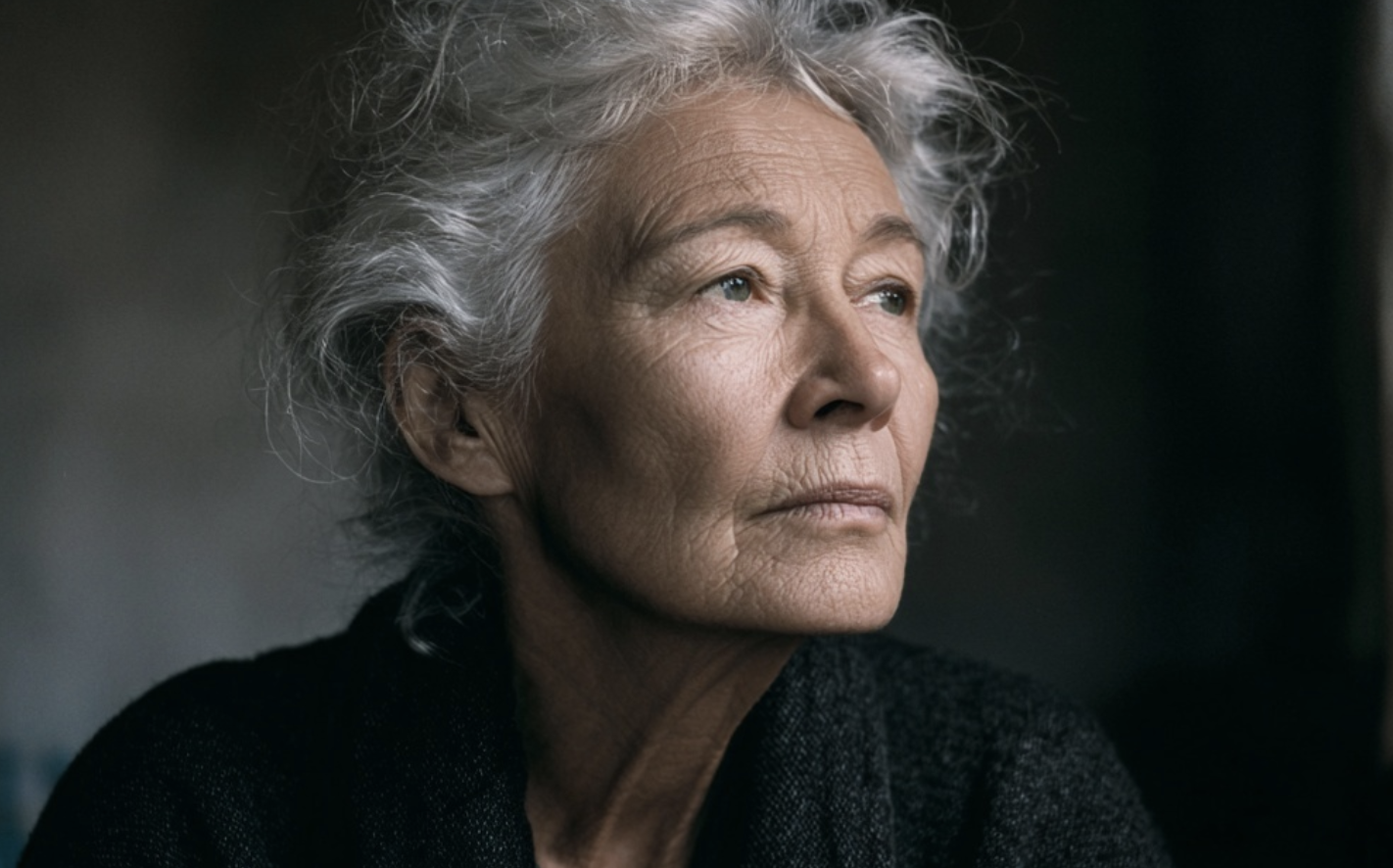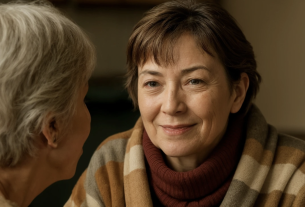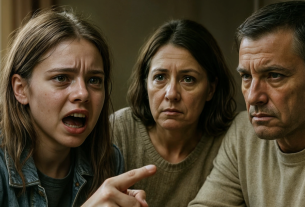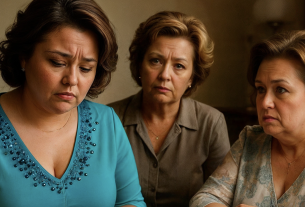“Mom, hi, I urgently need your help.”
Her son’s voice on the phone sounded like he was talking to a bothersome subordinate, not to his mother.
Nina Petrovna froze with the remote in her hand, never turning on the evening news.
“Hello, Kirill. Did something happen?”
“No, everything’s fine,” Kirill exhaled impatiently. “It’s just that Katya and I grabbed a last-minute package—flight’s tomorrow morning.
And there’s no one to leave Duke with. Can you take him?”
Duke. A huge, drooly Great Dane who, in her small two-room flat, took up more space than the old sideboard.
“For long?” Nina asked cautiously, already knowing the answer.
“Well, for a week. Maybe two. Depends. Mom, who else if not you? Putting him in a dog hotel is cruelty. You know how sensitive he is.”
Nina Petrovna looked at her sofa, newly reupholstered in a light fabric. She had saved up for six months, denying herself little things. Duke would destroy it in a couple of days.
“Kirill, I… it’s not very convenient. I just finished the renovations.”
“Mom, what renovations?” open irritation crept into his voice. “You re-papered the walls?
Duke’s well-behaved, just don’t forget to walk him. Okay, Katya’s calling—we’ve got to pack. We’ll drop him off in an hour.”
The line went dead.
He hadn’t even asked how she was. He hadn’t congratulated her on her birthday last week. Sixty-five.
She had waited for their call all day, made her signature salad, put on a new dress. The kids had promised to stop by, but never showed.
Kirill sent a short message: “Mom, happy b-day! Swamped at work.” Olya didn’t write anything.
And today—”I urgently need help.”
Nina Petrovna slowly sank onto the sofa. It wasn’t about the dog or the upholstery.
It was about the humiliating sense of being a function. She was free boarding, an emergency service, the last resort. A function in human form.
She remembered how many years ago, when the children were little, she dreamed they would grow up and become independent.
And now she realized that the scariest thing wasn’t loneliness in an empty apartment. Worse was waiting with bated breath for a call, knowing you are needed only when something is required of you.
Begging for their attention at the price of your own comfort and self-respect.
An hour later, the doorbell rang. Kirill stood on the threshold, holding the huge dog by the leash. Duke bounded inside, leaving muddy prints on the clean floor.
“Mom, here’s his food, here are his toys. Walk him three times a day—you remember. We’ve got to run or we’ll miss the plane!” He shoved the leash into her hands and, pecking her on the cheek in passing, vanished through the door.
Nina Petrovna was left standing in the hall. Duke was already busily sniffing the chair legs.
From deep in the apartment came the sound of tearing fabric.
She looked at her phone. Maybe call her daughter? Olechka, maybe she would understand? But her finger hovered over the screen and stopped.
Olya hadn’t called in a month. She was probably busy too. She had her own life, her own family.
And in that moment, for the first time, Nina Petrovna didn’t feel the usual hurt. Something else arrived instead—cold, clear, very sober understanding. Enough.
The morning began with Duke, deciding to show love, jumping on the bed and leaving two muddy paw prints the size of saucers on the snow-white duvet cover.
The new living-room sofa was already ripped in three places, and her favorite ficus, which she’d been growing for five years, lay on the floor with its leaves chewed.
Nina Petrovna took a swig of valerian straight from the bottle and dialed her son’s number. He didn’t pick up at once.
In the background she could hear the sound of waves and Katya’s laughter.
“Mom, what is it? We’re great, the sea is awesome!”
“Kirill, about the dog. He’s wrecking the apartment. He tore up the sofa, I can’t handle him.”
“What do you mean?” her son said, genuinely surprised. “He’s never torn anything. Maybe you’re locking him up? He needs freedom. Mom, don’t start, okay? We just got here, we want to relax. Just walk him longer and he’ll calm down.”
“I walked him for two hours this morning! He pulls so hard I almost fell. Kirill, please come get him. Find another boarding option.”
There was a pause on the line. Then Kirill’s voice turned hard.
“Mom, are you serious? We’re on the other side of the world. How am I supposed to take him? You agreed. Or do you want us to drop everything and fly back because of your whims? That’s selfish, Mom.”
The word “selfish” landed like a slap. She, who had lived her whole life for them—a selfish person.
“I’m not being capricious, I—”
“That’s it, Mom, Katya brought cocktails. Entertain Duke there. I’m sure you’ll be friends. Kisses.”
And the line went dead again.
Nina’s hands were trembling. She sat down on a kitchen chair, away from the wreckage. The sense of powerlessness was almost physical. She decided to call Olya. Her daughter had always been the more reasonable one.
“Hi, Mom.”
“Hi, Olya. Is this a bad time? It’s urgent. Kirill left me his dog and flew out. The dog’s unmanageable. He’s ruining the furniture; I’m afraid he’ll soon bite me.”
Olya sighed heavily.
“Mom, Kirill asked you, so it must have been really necessary. Is it so hard to help your own brother? We’re family. So he ripped the sofa—buy a new one. Kirill will repay you. Probably.”
“Olya, it’s not about the sofa! It’s about the attitude! He just presented me with a fait accompli!”
“And how was he supposed to do it? Beg on his knees? Mom, stop it. You’re retired, you have tons of free time. Stay with the doggy, what’s the big deal? I have to go, my boss is watching.”
The call ended.
Nina Petrovna set the phone on the table.
Family. What a strange word.
In her case it meant a group of people who remembered you when they needed something, and accused you of selfishness if you couldn’t or wouldn’t immediately fulfill their demand.
That evening the downstairs neighbor rang, furious as a fury.
“Nina! Your dog has been howling for three hours straight! My child can’t sleep! If you don’t quiet him down, I’ll call the police!”
Duke, standing behind Nina, barked happily, confirming the neighbor’s words.
Nina closed the door. She looked at the dog wagging his tail, waiting for praise.
Then at the shredded sofa. At her phone. Inside her, a dull, heavy irritation was growing.
She’d always tried to solve things nicely. To persuade, to explain, to put herself in others’ shoes.
But her logic, her feelings, her arguments were needed by no one. They broke against a wall of condescending indifference.
She picked up the leash.
“Come on, Duke, let’s go for a walk.”
She led the dog along the park alley, feeling the tension in her shoulders turn into a dull, throbbing ache.
Duke lunged ahead, nearly tearing the leash from her weakening hands. Each jerk echoed her son’s and daughter’s words: “selfishness,” “tons of time,” “hard to help?”
Coming toward her with a light, almost dancing step was Zinaida, her former colleague. A bright scarf, a stylish haircut, laughing eyes.
“Ninochka, hi! I almost didn’t recognize you—so busy! With the grandson again?” She nodded at Duke.
“It’s my son’s dog,” Nina answered dully.
“Ah, got it!” Zina laughed carelessly. “You’re our eternal go-to savior. And me—imagine—I’m flying to Spain in a week! Signed up for flamenco, can you believe it?
At my age! Going with the girls from the group. My husband grumbled at first, then said, ‘Go, cut loose, you’ve earned it.’ When did you last have a vacation?”
The question hung in the air. Nina couldn’t remember. For her, “vacation” had always meant the dacha, grandkids, helping her children.
“You look tired,” Zinaida said with sincere sympathy. “You can’t carry it all yourself.
The kids are grown; let them manage on their own. Otherwise you’ll end up dog-sitting while life passes you by. Okay, I’ve got to run—rehearsal!”
She flitted off, leaving a trail of expensive perfume and ringing emptiness.
“While life passes you by.”
That simple phrase worked like a detonator. Nina Petrovna stopped so abruptly that Duke looked at her in surprise.
She looked at that huge dog, at her hands clamped around the leash, at the gray buildings around her.
And she realized she couldn’t do it anymore. Not one more day. Not one more hour.
Enough.
She pulled out her phone. Her trembling fingers opened a search. “Best dog hotel Moscow.”
The very first link led to a site with glossy photos: spacious kennels, a pool, a grooming salon, individual sessions with a trainer. And prices that took her breath away.
Nina Petrovna decisively tapped the phone number.
“Hello. I’d like to book a room. Yes, for a Great Dane. For two weeks. With full board and spa treatments.”
She called a taxi right there in the park. In the car, Duke behaved surprisingly calmly, as if sensing the change.
The hotel smelled not of dog but of lavender and expensive shampoos. A nice young woman in uniform handed her a contract.
Without batting an eye, Nina wrote Kirill’s name and phone number in the “Owner” field.
In “Payer”—his as well. She paid the deposit from the money she’d been saving for a new coat. It was the best investment of her life.
“We’ll send a daily photo report to the owner’s number,” the girl smiled, taking the leash. “Don’t worry, your boy will like it here.”
Returning to her peaceful—if battered—apartment, Nina Petrovna, for the first time in many years, felt not loneliness, but calm.
She poured herself tea, sat on the intact edge of the sofa, and sent two identical messages. One to Kirill. The other to Olya.
“Duke is safe. He’s at a hotel. Direct all questions to his owner.”
Then she silenced her phone.
The phone started vibrating on the table three minutes later. Nina looked at the glowing screen where “Kirill” flashed, and took another sip of tea.
She didn’t answer. A minute later it vibrated again. Then a message from Olya: “Mom, what does this mean? Call me back immediately!”
She turned up the TV volume. She knew what was happening on the other end of the line.
Panic. Indignation. Attempts to figure out how their convenient, unfailingly obliging mother could do such a thing.
The real storm broke two days later. The doorbell rang insistently, almost aggressively.
Nina Petrovna unhurriedly walked over and looked through the peephole. Kirill and Olya stood on the threshold. Tanned, but angry. The vacation was obviously ruined.
She opened the door.
“Mom, are you out of your mind? What hotel? They sent us the bill—did you see those numbers? You decided to bankrupt us over some dog?”
“Hello, children,” she replied calmly. “Come in. Shoes off, please—I just mopped the floors.”
That calm threw them off more effectively than any argument. They came inside. Kirill looked over the torn sofa, the toppled plant.
“There,” he jabbed a finger at the sofa. “What’s that?”
“That, Kirill, is the result of your well-bred dog’s stay in my apartment. I called a repairman; he assessed the damage. Here’s the invoice for reupholstering and for a new ficus.”
She handed him a neatly printed sheet.
“You’re billing me?” Kirill gasped. “You were supposed to watch him!”
“I was supposed to?” For the first time in many years she looked at her son not with love, but with cold curiosity.
“I don’t owe you anything, children. And you don’t owe me anything either. I take it you didn’t come to return my hotel deposit and reimburse the damage?”
Olya stepped in, trying to smooth things over.
“Mommy, why like this? We’re family. We would’ve figured it out. Kirill lost his temper—happens to anyone. Why go straight to extremes?”
“Extremes are when your own son calls you selfish because you don’t want your home turned into ruins.
Extremes are when your own daughter says you have ‘tons of time’ to wait on her brother. And this,” she nodded at the invoice, “this is simply the consequence of your decisions.”
Kirill flushed darkly.
“I’m not paying for this! Not a penny! And not for your stupid hotel either!”
“Fine,” she said simply. “I didn’t doubt it. Then I’m selling the dacha.”
It was a punch to the gut. The dacha they already had plans for: kebabs, the bathhouse, relaxing with friends. Their dacha. The place they came solely to rest while their mother spent all summer weeding the beds and painting the fence.
“You have no right!” Olya shouted, forgetting to play peacemaker. “It’s ours too! We spent our whole childhood there!”
“The documents are in my name,” she shrugged. “And childhood, Olya dear, is over.
The proceeds will be just enough to cover the expenses, compensate me for moral damages, and maybe let me go to Spain.
Zinaida says it’s wonderful there.”
They looked at her as if at a stranger. Before them stood not their quiet, compliant mother, but a woman with a steel core they hadn’t suspected existed.
A woman who no longer feared their anger, their manipulations, their grievances.
For the first time in many years, a tense silence settled in the room. An awkward lull of realization. They had lost.
A week later Kirill transferred the entire amount to her card, to the penny. No apologies, no further calls followed.
And Nina Petrovna wasn’t expecting any. She took her old, almost unused suitcase down from the top shelf. She called Zinaida.
“Zinochka, hi. Do you have one more spot for flamenco?”



